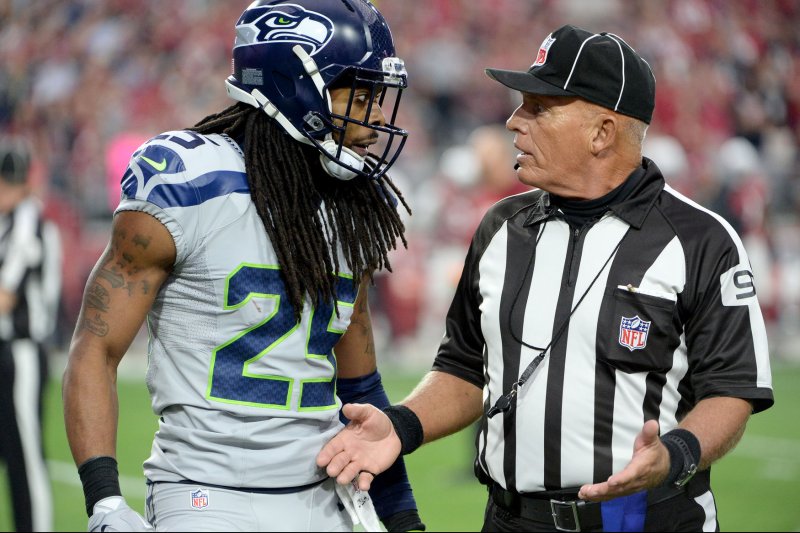Seattle Seahawks' Richard Sherman questions Side Judge Tom Hill's call on him for holding in the first quarter of the Seahawks-Arizona Cardinals game at University of Phoenix Stadium in Glendale Arizona, January 3, 2016. Photo by Art Foxall/UPI |
License Photo
Seattle Seahawks cornerback Richard Sherman doesn't plan to change his approach to the game despite the risks of concussions.
The outspoken Sherman sat down for an interview with GQ, telling the magazine he would have no problem allowing his son to play the sport.
"It doesn't change the way I play," Sherman said. "I've always tried to tackle with the best form, and not try to always get people down on the ground without using my head. But it doesn't change the way I think about the game or how I feel about my kids playing the game.
"I feel like this game has given me a lot more than it's taken. It obviously takes a toll on your body and you understand the risks going into it, but you also have to understand that it's taught me discipline, hard work, teamwork, being dependable, being available, how to be a leader, how to work past adversity. Just so many things that you use in your everyday life. And you can't take that for granted.
"So maybe my son doesn't end up being a professional athlete, maybe he never even plays a sport, but I wouldn't hold him back from something that's been so great to me."
Last week the NFL's settlement of nearly $1 billion with retired players who filed concussion lawsuits was upheld by a three-judge panel of the Third U.S. Circuit Court of Appeals.
The settlement would resolve thousands of lawsuits and cover more than 20,000 NFL retirees for the next 65 years. The league estimates that 6,000 former players, or nearly three in 10, could develop Alzheimer's disease or dementia.
The unanimous ruling came weeks after an NFL official speaking to Congress acknowledged a link between football and chronic traumatic encephalopathy, or CTE.
Jeff Miller, the NFL's senior vice president for health and safety, admitted such a link exists while participating in a discussion in March on concussions that was organized by the U.S. House of Representatives' Committee on Energy and Commerce.
NFL commissioner Roger Goodell said before the Super Bowl that there is a "culture change" in the league when it comes to concussions.
"The number of concussions went up this year and they're going to go up and they're going to go down in any given season, but screenings went up by 108 percent and also we saw more self-reporting in the players and teammates," Goodell told "Good Morning America" anchor Robin Roberts. "That's what I call the culture change.
"It used to be, as you know, 'It's just a ding.' Those days are long gone and that's a positive thing for our game."















